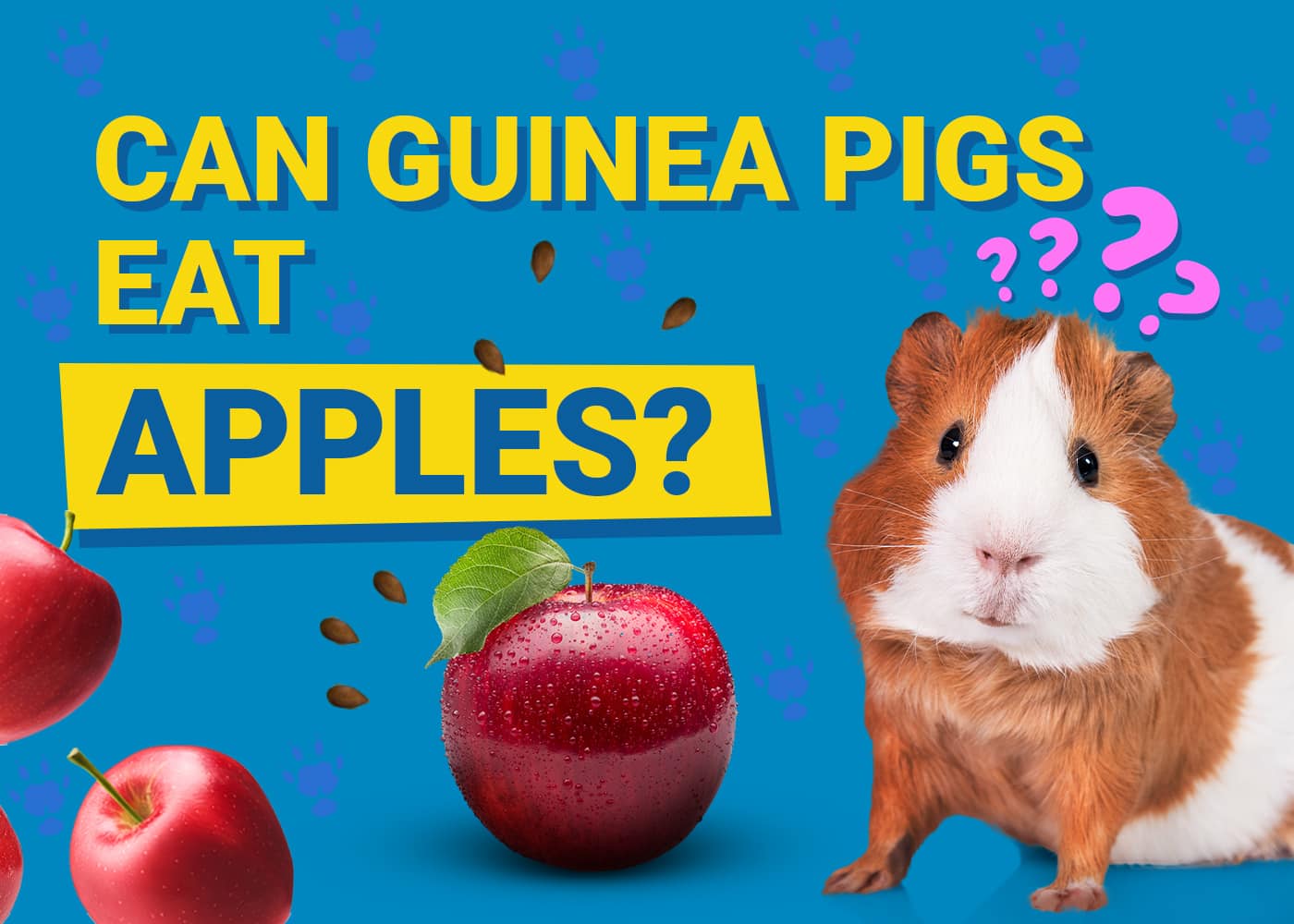
Guinea pigs can make great family pets. They are small, don’t need regular walking, and they tend to tolerate or enjoy being held. They do have very specific dietary requirements, however, that consist of feeding a combination of hay, pelleted food, and fresh vegetables and while it might seem like a lot of work, especially compared to pets like dogs and cats that can get all of their dietary requirements from a single type of food, it is important that you meet their daily nutritional needs.
To help, we have included reviews of ten of the best guinea pig foods in the UK, as well as a guide to help you find the food that is best for your little one.

A Quick Comparison of Our Winners (2024)
| Image | Product | Details | ||
|---|---|---|---|---|
| Best Overall |
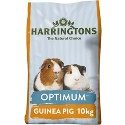 |
Harringtons Optimum Guinea Pig Food |
|
Check Price |
| Best Value |
 |
Extra Select Complete Guinea Pig Mix |
|
Check Price |
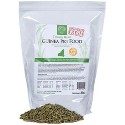 |
Small Pet Select Timothy Based |
|
Check Price | |
 |
Science Selective Supreme |
|
Check Price | |
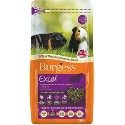 |
Excel Burgess Nuggets |
|
Check Price |
The 10 Best Guinea Pig Foods in the UK
1. Harringtons Optimum Guinea Pig Food – Best Overall
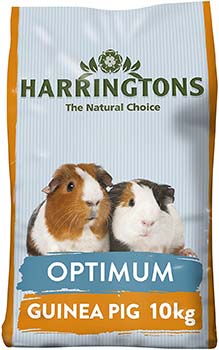
| Food type: | Pellets |
| Protein: | 17% |
| Fibre: | 17% |
| Weight: | 10kg |
Harringtons Optimum Guinea Pig Food is a pellet-based food consisting of 17% protein and 17% fibre, both of which are about reasonable for a guinea pig’s daily diet. The pellet-based food helps prevent selective eating, whereby a guinea pig eats its favorite ingredients and leaves the ingredients it doesn’t like.
It is a very reasonably priced food that has been fortified with vitamin C, an essential ingredient in guinea pig food. It also includes vitamins A, D, and E. Vitamin D is especially important to indoor guinea pigs because they will not be getting any of these essential vitamins from the sun. This is a big bag of food, which means that you won’t have to buy it too often, but the weight of the food causes a lot of the pellets to crush, so expect some dust in the bottom of the bag when it arrives.
Despite this, the combination of low price, good protein and fibre levels, and general quality of the food makes it our choice as the best overall guinea pig food available in the UK.
2. Extra Select Complete Guinea Pig Mix – Best Value
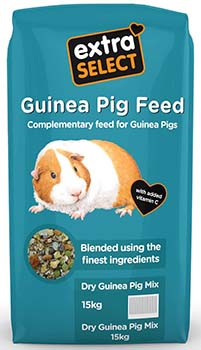
| Food type: | Mix |
| Protein: | 16.3% |
| Fibre: | 9.1% |
| Weight: | 15kg |
Extra Select Complete Guinea Pig Mix is a cheap complementary food for guinea pigs. It is a muesli-type mix, which might be a problem for selective eaters because they will pick out the pieces they want and leave behind those they aren’t keen on. If your guinea pig is an especially picky eater, you could be left throwing away a lot of the food, so it is better suited to good eaters that will eat every piece.
It has 16.3% protein and 9.1% fibre, both of which could do with being a little higher, but they aren’t considered dangerously low and can be supplemented by feeding appropriate vegetables and decent hay.
Fortified with vitamin C, which is a vital ingredient for guinea pigs and helps maintain a strong immune system, the low price of this food makes it one of the best guinea pig foods for the money, but you should consider a pellet food if your cavy picks and chooses his ingredients.
3. Small Pet Select Timothy-Based Guinea Pig Food

| Food type: | Pellets |
| Protein: | 14% |
| Fibre: | 25% |
| Weight: | 2.27kg |
Small Pet Select Timothy Based Guinea Pig Food is an expensive food, but it does contain Timothy hay as its main ingredient.
As well as being a premium ingredient, Timothy hay is high in fibre and the reason that this food has 25% fibre. This is higher than the recommended 18%-20% and it means that it could lead to constipation or diarrhoea in your guinea pig. Introduce the food slowly, especially if moving from a lower fibre diet. The high fibre content also means that the 14% protein level falls some way below the 18% advised level. This combination of high fibre and low protein means that the Small Pet Select Timothy-Based Guinea Pig Food is better suited to overweight guinea pigs or those that are prone to eating large amounts.
The food is pellet based, though, and does contain 400mg of vitamin C per pound, which is the recommended level for cavies.
4. Science Selective Supreme Guinea Pig Food
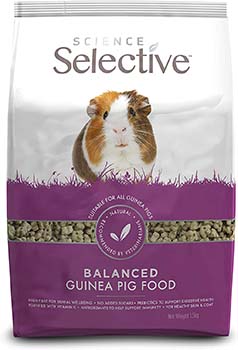
| Food type: | Pellets |
| Protein: | 16% |
| Fibre: | 15% |
| Weight: | 10kg |
Science Selective Supreme Guinea Pig Food is an expensive food, but it is considered a good quality food, popular with guinea pigs, and meets the nutritional requirements of your cavy.
It includes 16% protein, which is slightly on the low side, but 15% fibre, which is at the top end of the recommended level. Fibre is not only good for gut health and to maintain a healthy digestive system, but it also helps your guinea pig feel fuller for longer, which means that it is ideal for those that will eat and eat. The food has been fortified with vitamin C and contains healthy amounts. Like humans, guinea pigs do not make their own vitamin C, which means that it must come from their diet and is one of the nutritional reasons that we feed vegetables and leafy greens.
Although Science Selective Supreme does fall on the expensive side of the scale, it is a good quality food that helps ensure you are meeting your guinea pig’s daily needs.
5. Excel Burgess Nuggets With Blackcurrant and Oregano

| Food type: | Pellets |
| Protein: | 17% |
| Fibre: | 15% |
| Weight: | 2kg |
Excel Burgess Guinea Pig Nuggets With Blackcurrant and Oregano is a pellet guinea pig food that contain 17% protein and 15% fibre, both of which are considered acceptable levels for healthy adults. It also has a very good amount of vitamin C with over 1,000 milligrams per kilogram of food.
Although it is quite expensive, the food is enjoyed by guinea pigs, especially thanks to its pellet formula that ensures your cavy is getting all the vitamins and minerals offered by the food. Its primary ingredient is grass meal, which is an ingredient that most guinea pigs enjoy and that provides much of the fibre. It also has blackcurrant to give a naturally sweet and appealing flavour, as well as oregano, which works to calm and relax even the most agitated small animals.
The texture of the nuggets means that you will find dust at the bottom of the bag, and the nuggets are smaller than most which means that some guinea pigs may turn their noses up at them.
6. Wagg Twitch Guinea Pig Food
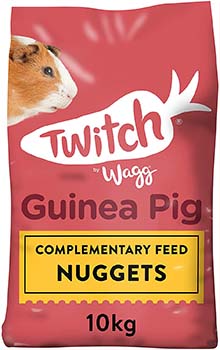
| Food type: | Pellet |
| Protein: | 16% |
| Fibre: | 19% |
| Weight: | 10kg |
Wagg Twitch Guinea Pig Food is highly rated, reasonably priced guinea pig food in pellet form. Its main ingredients include oat fibre and wheat fibre, and the food has been fortified with a good range of vitamins and minerals.
It consists of 16% protein, which is slightly lower than ideal, and 19% fibre, which makes this a high fibre food that complements a regular supply of hay and a good variety of leafy greens throughout the week. Wagg only has 250mg/kg of vitamin C, which is about half of what would be considered ideal, so you may need to provide a supplement or ensure that you feed vegetables that are high in this essential vitamin.
The food comes in a decent sized bag, although the coarse pellets are not popular with all guinea pigs, so it might be worth buying a smaller amount and testing your cavy to see if it likes the texture and pellet size.
7. Burgess Excel Guinea Pig Nuggets With Mint
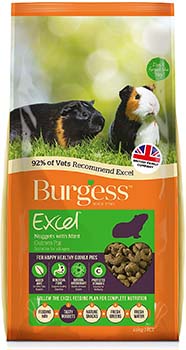
| Food type: | Pellet |
| Protein: | 17% |
| Fibre: | 17% |
| Weight: | 10kg |
This 10kg bag of Burgess Excel Guinea Pig Nuggets includes additional mint, which not only gives the food a more appealing smell and flavour for your guinea pigs but also helps with good digestion and to ensure a healthy digestive system.
It consists of 17% protein and the same level of fibre, both of which are considered appropriate for a healthy adult guinea pig, and it has been fortified with additional vitamin C so that it contains 1,050mg/kg. When combined with a good hay and supplemented with leafy greens, it ensures that your cavy is getting the right amount of the essential vitamin. The food also contains prebiotics that further ensure good digestion.
The food is a little expensive compared to similar foods. The brittle pellets may not be to all cavies’ tastes and there are a lot of broken pellets and some dust at the bottom of the bag.
8. Oxbow Essentials Adult Guinea Pig Food

| Food type: | Pellets |
| Protein: | 14% |
| Fibre: | 27% |
| Weight: | 2.25kg |
Oxbow Essentials Adult Guinea Pig Food is a premium guinea pig pellet that uses Timothy grass meal as its main ingredient. Timothy hay is expensive, hence the high price of this food, and it gives a food that is high in fibre and somewhat low in protein.
As a result, Oxbow Essentials is made up of 14% protein, which needs to be higher, and 27% fibre, which is a lot higher than recommended levels for a healthy adult. The food may be ideal if you have been advised to put your cavy on a high fibre diet.
Oxbow Essentials has 250mg/kg of vitamin C, which means that you will need to supplement these levels with some kind of additive or ensure that you provide plenty of leafy greens that are also high in the essential ingredient. This food also contains additional sugar, which means that it might be best fed only as an occasional treat and not as a regular part of your guinea pig’s diet.
9. Selective Naturals Grain Free Guinea Pig Food
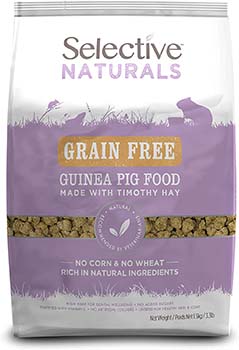
| Food type: | Pellet |
| Protein: | 16% |
| Fibre: | 20% |
| Weight: | 1.5kg |
Although many commercial guinea pig foods do include grain, processed grains are difficult for guinea pigs to digest, which means that they can cause gastrointestinal upset and may prevent your cavy from getting its nutritional requirements from the food it eats.
Selective Naturals Grain Free Guinea Pig Food is one of few foods that are labelled as grain free and could help remedy an upset stomach or any grain sensitivity that your little one suffers. It consists of 16% protein, which is slightly low, and 20% fibre, making it suitable for a high fibre diet. It does contain 1,000mg/kg of vitamin C, which should be adequate to meet a cavy’s daily vitamin C requirement.
However, the food is expensive and only really necessary for those guinea pigs with special dietary requirements. Also, the ingredients state that it may contain GMOs, which will deter a lot of buyers.
10. Mr Johnson’s Supreme Guinea Pig Mix

| Food type: | Mix |
| Protein: | 17% |
| Fibre: | 9% |
| Weight: | 15kg |
Mr Johnson’s Supreme Guinea Pig Mix is a complementary guinea pig food. It is a muesli style mix so is not suitable for picky eaters that eat what they want and leave the rest.
It is modestly but not brilliantly priced and has a very low fibre ratio of 9%. Its 17% protein ratio is considered a suitable level for healthy adult guinea pigs, but the low fibre level is problematic because picky eaters will tend to leave the ingredients that contain fibre and eat the rest, so your cavy could end up with poor digestive health, and a low fibre diet can also lead to dental problems over time.
The food can be quite dusty, but it does contain 350mg/kg of vitamin C, which should be just about enough if it is contained in the bits that your cavy eats and not those that it leaves.

Buyer’s Guide: How to Choose the Best Guinea Pig Food
Guinea pigs have different dietary requirements than other pets. Unlike dogs, guinea pigs need to be given a variety of different food types to ensure that they are getting everything they need. You will need to feed a constant supply of a good-quality hay, as well as a pellet or muesli mix, while supplementing these with fresh vegetables and fruit throughout the week. Read on for more information on what to feed your cavy and how to choose the best food.
Guinea Pig Diet
Guinea pigs are natural grazers. In the wild, they would feed off grass as well as vegetation. As well as having ongoing access to fresh water, a cavy’s diet should consist of at least 80% hay and around 8% vegetables, leaving 12% of their daily diet as uniform food.

Muesli vs Pellet
This uniform food can take the form of either a muesli style mix or pelleted food, depending on your preferences and those of your guinea pig.
Nutritional Requirements
Experts generally recommend a diet consisting of 18%-20% protein and 10%-16% fibre. A little higher or lower than this should be safe for a healthy adult, and if your vet has advised a high or low fibre diet, you should follow these recommendations to ensure good health.
The Importance of Vitamin C
Guinea pigs, like humans, are unable to create vitamin C themselves so it is important that their food also contains adequate levels of this essential vitamin. Look for those foods that contain around 400 milligrams of vitamin C per kilogram.
Vitamin C is water-soluble, which means that small amounts of excess vitamin C pass through the kidneys and are safely expelled by the body as urine. It is very difficult to give a cavy too much vitamin C when feeding a combination of hay, pellets, and vegetables, although it is possible to do so if you give a liquid or powder supplement. By making sure that the food does have good vitamin C levels, you can avoid the possibility of giving too much.
Hay
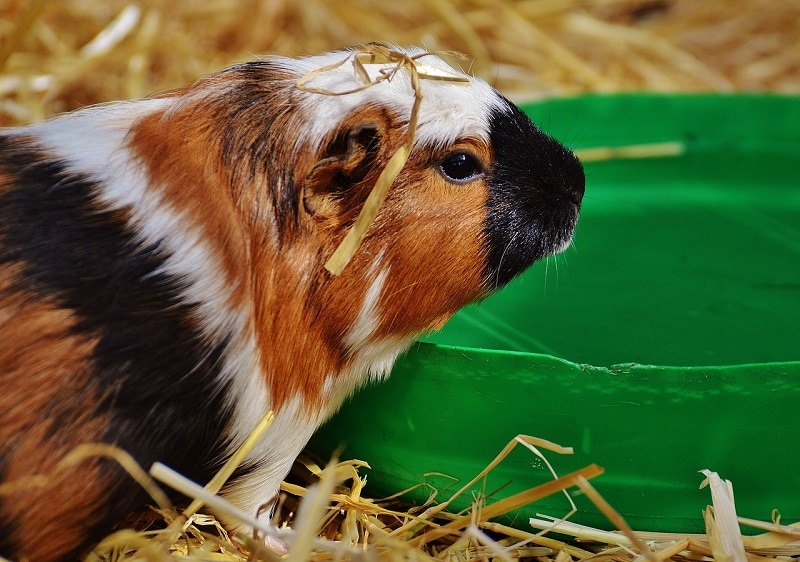
Hay is just dried grass. Unless you have a large garden and can provide your guinea pig with plenty of fresh cuttings every day, you will likely have to feed some form of dry hay. Although there are several hays available, including meadow hay and alfalfa hay, Timothy is considered the best for your pet. It has the right nutrients and an appealing texture. Not only does it provide the high fibre that your cavy needs, but its consistency and texture mean constant gnawing, which will help grind down and maintain teeth.
You can effectively give an unlimited amount of natural hay each day without it leading to illness or overfeeding. If your guinea pig is putting on weight, it is more likely to be the pellets or the vegetables and treats that you are feeding.
Vegetables
You should feed approximately 1 cup of fresh vegetables per day. Giving a variety of different veggies over the course of the week will keep your cavy interested and prevent it getting bored of the same food, while also enabling you to meet all vitamin and mineral requirements for your pet.
Romaine lettuce, kale, cilantro, and parsley should make up the bulk of the vegetables and can be combined with bell peppers and broccoli. Carrot tops are another popular addition.
Fruit can be served, but only as a treat and only occasionally. It shouldn’t form a major part of the diet. Bananas are a good option, as discussed above, and other options include apples, blueberries, raspberries, and strawberries, all of which need to be fed sparingly because of the high sugar content.
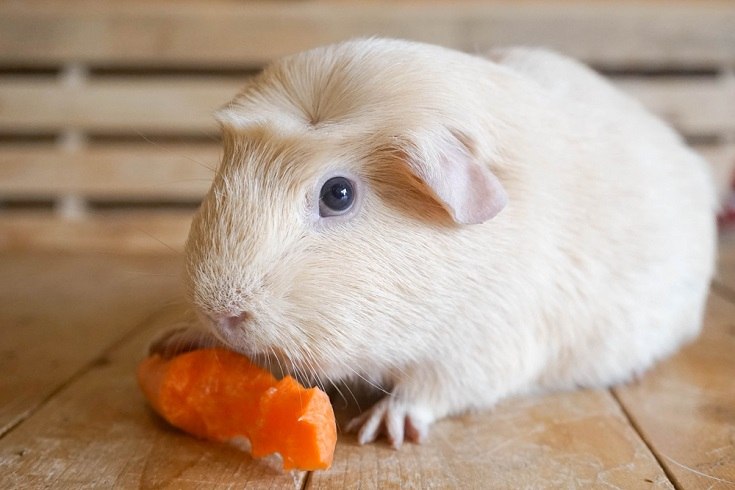

What Foods Are Bad for Guinea Pigs?
Although there is a long list of leafy greens and other foods that guinea pigs can eat, there are also numerous foods they should avoid. Always avoid feeding processed foods, because the additives and other ingredients are not really designed for guinea pig consumption. Also avoid these foods:
What Do Guinea Pigs Drink?
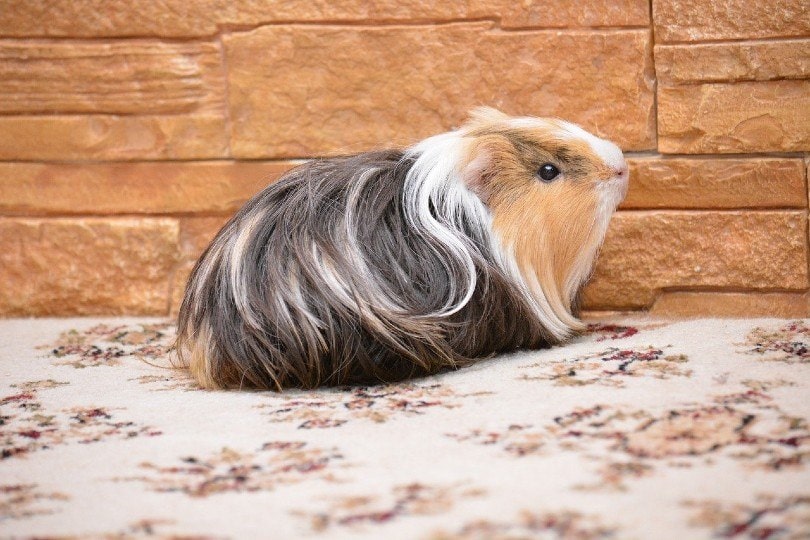
A guinea pig should only be given fresh, clean water, and this should be always available so they can drink whenever they want. Guinea pigs should not be given excess sugar, salt, or fat, and these are often found in soda, juice, and other drinks.
Can a Guinea Pig Eat Bananas?
Not only are bananas considered safe for guinea pigs but because they are rich in fibre, vitamin A and vitamin B, and contain some essential vitamin C, but they are considered a somewhat healthy treat to feed. However, they are high in sugar, so should only be given sparingly and only fed as a treat rather than as a staple part of their diet.
Can Guinea Pigs Have Cucumbers?
Cucumbers are not toxic to guinea pigs and are, therefore, quite safe to feed. They are also low in sugar, which means that they should not cause your cavy to put on weight. However, they also have a high moisture content and are low in vitamin C. This means that while they can eat cucumber, most guinea pigs would benefit from being given better quality and more nutritionally beneficial foods instead. Feed no more than a slice or two, two or three times a week.
Conclusion
Guinea pigs are sweet, cute little pets, and it is very easy to become attached to them. As well as providing access to fresh water and a constant supply of a good quality hay, along with green vegetables each day, you will also need to feed a muesli or pellet style food to hit all the vitamin and mineral requirements of this little rodent. There are plenty of commercial foods available, which is great for choice but can also leave you baffled by the selection. Hopefully, our reviews and guide have helped you find the one most suitable for your cavy.
We believe that Harringtons Optimum Guinea Pig food is a good price, appeals to most guinea pigs, and prevents picky eating thanks to its pellet form, but if you want to spend a little less and yours isn’t a selective eater, you can opt for Extra Select Guinea Pig Mix. But this is a muesli style food and it could benefit from having slightly higher protein and fibre levels.
Featured Image Credit: Julia Mols, Shutterstock






